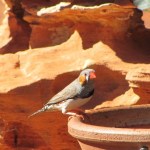zebra finch
Dopamine is an important hormone released from neurons involved in reward pathways. Researchers at Cornell University wanted to know if dopamine signaling was involved in how birds learn songs. Their findings, recently published in Science, present evidence that neurons in the brain of zebra finches do in fact decrease dopamine signals when the birds hear an error in their song in comparison to when they sing 'correctly'. The researchers also found that dopamine signaling was enhanced when the birds corrected a mistake made during a prior attempt.
Sources:
V. Gadagkar…
Changes in the daily variability of high and low temperatures in certain regions may stress wild bird populations. A new study of semi-wildish Zebra Finches demonstrates this. I have a post on the research here, at 10,000 birds. Have a look!
tags: neurobiology, neuroscience, animal communication, birdsong, premotor nucleus HVC, brain temperature, neural circuitry, motor behaviors, bioacoustics
Captive-bred Zebra Finch, Taeniopygia guttata, at
Bodelwyddan Castle Aviary, Denbighshire, Wales.
Image: Adrian Pingstone/Wikipedia [larger view].
Birdsong is the primary model system that helps scientists understand how the brain produces complex sequences of learned behavior, such as playing the piano. In songbirds, there are many interconnected brain regions that play specific and important role in the production of song. These…
tags: dopamine, behavior, evolution, rewarding affiliative behaviors, brain reward pathways, songbirds, birdsong, zebra finch, Poephila guttata, neurobiology
A pair of wild Zebra (Chestnut-eared) Finches, Poephila guttata.
Image: Adelaide Zebra Finch Society [larger view].
People have been known to "sing for joy" and we often experience happiness when others sing for us. Additionally, birdsong has often brought joy to those who have listened, but what about the birds themselves? Do birds experience "happiness" when they hear birdsong, or when they sing for others? According to newly…
